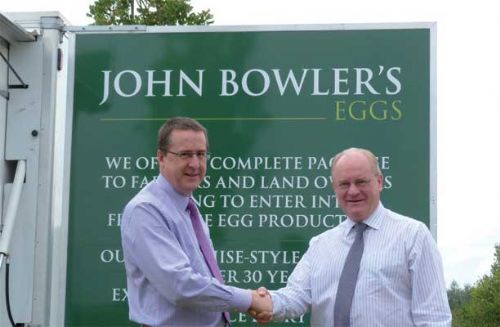
The Bowler Group is to join the British Free Range Egg Producers Association (BFREPA), swelling the ranks of the association by a third at a stroke.
Bowler’s, which is one of the biggest independent free range egg production companies in the United Kingdom, has more than 2.5 million hens under contract. By joining BFREPA, Bowler’s will increase the number of birds represented by the association to 10.1 million. Both Bowler’s and BFREPA chairman, John Retson, believe that the decision to join the association will help BFREPA stand up for producers far more effectively during what is a critical time for the free range egg sector.
"We need to speak with the strongest united voice possible," said John Retson. "These are very difficult times for free range egg producers. They really have been feeling the squeeze because there are just too many eggs on the market. The more producers we represent, the stronger our voice will be. Bowler’s decision to join us is very good news for all producers because they not only bring with them two and a half million birds but also the benefit of 30 years’ experience in this industry. They will add both weight and experience to the
association."
Colin Shed, Bowler’s finance director said, "We felt that it would be in the best interests of producers for us to join forces with BFREPA. It is a crucial time for the industry. We have been going through this period of oversupply and producers have been suffering as a result of over-expansion. It is in the interests of producers that they have a representative body that seeks to unite all producers with a view to possibly preventing this happening again in the future and I think we at Bowler’s can help.".
With the addition of John Bowler’s birds, BFREPA will now represent 67 per cent of all free range egg layers in the country. John Retson would like to see that figure increase to 80 per cent, and he and the council have put in place plans to help transform the effectiveness of the association as a representative body.
"I would like to see BFREPA become the strongest representative body within the egg industry as a whole," said John. "We need to drive the association on and we have put a number of measures in place to make that happen. I think that is one of the reasons that Bowler’s have decided to come on board."
The most significant measure will be the appointment of a new director of policy, which is intended to place BFREPA on a much more professional footing. John also wants the association to exert more influence over political decision-making and the drafting of legislation, at the same time as maintaining strong working relationships with other representative bodies, packers and supermarkets. He would like BFREPA to influence research and also to become more involved in the promotion of free range eggs. John would also like to see BFREPA creating its own database as a tool to help prevent the free range egg sector drifting into the problem of oversupply again in the future.
Colin Shed said that the appointment of a director of policy was an important move for BFREPA and it was one that he thought should be supported. "This is good for the industry and for producers in my view, and we want to support both John and BFREPA in moving the association forward, increasing its status within the industry and giving it a larger, more united, presence."
He said that the coming months would be an important time for the egg sector, not only because of the problem of oversupply but also because of the European Union’s ban on conventional cages, which is due to come into force on January 1 next year. It is estimated that 25 per cent of the EU laying flock could be illegal when the ban comes into force. There are concerns about how the EU will deal with these illegal eggs and how those eggs could affect the UK egg market if they were to find their way across the Channel.
"January, February and March next year could possibly be critical. We need to protect our industry and, hopefully, a stronger BFREPA may help to do that." Bowler’s began egg production on their first farm in 1980. They now have more than 170 farms under contract across the country and operate a franchise style system, providing producers with an easy way into free range production. The turnkey package they offer includes dealing with planning applications, financial forecasting, business planning, groundworks, site development, health and safety, buildings and equipment, pullets, feed, full training and support, transport, old hen removal, collection of eggs and a long-term market for the producer’s eggs.
